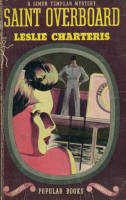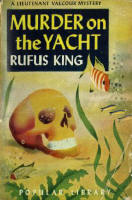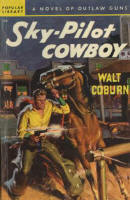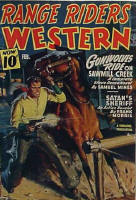|
|
Popular Library |
|
|
Click the group of books beginning with number:
Later Pop Lib
|
Ned Pines, the creator of Popular Library, had made a name for himself as the producer of the "Thrilling" pulps, i.e., Thrilling Detective, Thrilling Wonder Stories, Thrilling Westerns, and several others. The first hundred paperback covers were mostly done by H. Lawrence Hoffman. One of Popular Library's early trademarks was to put a small B&W copy of the cover art on the title page. The cover illustrations were, if anything, overly simplified, though they were certainly distinctive. The pulp magazine covers, on the other hand, had stark contrasts and bright colors. These first books (often referred to as "The Wartime Books") were written by some of the greatest authors of the period: Rufus King, Mignon G. Eberhart, and John Dickson Carr, to name a few. The vast majority were mysteries. And then, somewhere before the 150-mark, things changed dramatically. The cover art became bold, sharp, detailed and vivid, with sometimes very dramatic color contrast. Indeed, many of the "Popular" and "Thrilling" series of pulp magazine covers were copied for Popular Library books (see the "Twins" section of the database). More westerns came into in the line-up; and eventually the topics, often the titles (and most certainly the cover art), became overtly provocative in nature.
Popular Library numbers 1, 67, 166 & a magazine from Feb 1945 by Thrilling Publications. The first two cover illustrations were done using an airbrush, which gave them soft tones and gentle contrast. Many later books used "recycled" art from pulp magazines, which usually portrayed great detail, bold colors and vivid contrast.
Popular Library still relied on many of its regular contributors, such as Octavus Roy Cohen, Ernest Haycox, and Rufus King. There were also some other big literary names in the lineup, such as John Steinbeck and Arthur Miller, but many of the more dramatic titles were by virtual unknowns, authors who generally remain unknown today. But Oh My, the cover art! By far, they were the most eye-catching, dramatic pictures to grace the fronts (and, starting in the mid-400 numbers, the backs) of books. Obviously, it was the cover art that sold the works, and itís the covers that make these some of the most collectible of all the vintage paperbacks today. Just as Dell did during this period, Popular Library added a 1,000's digit to some of its books to indicate a later printing. #1523, for example, is a later printing of #523. Usually, the cover art remained the same as the original.
Updated June 2021
|



